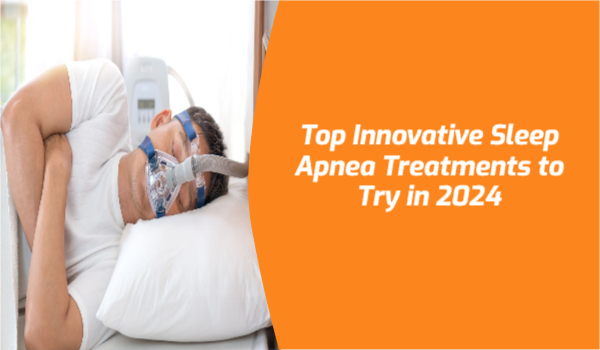
Sleep apnea is a serious condition that disrupts your sleep by causing your breathing to repeatedly stop and start. This can lead to a variety of health problems, including high blood pressure, heart disease, and stroke. If you've been diagnosed with sleep apnea, you're probably familiar with the gold-standard treatment: continuous positive airway pressure (CPAP) therapy. While CPAP is effective, it's not for everyone. The mask and machine can be uncomfortable and disruptive to sleep. Thankfully, there are a number of innovative sleep apnea treatment options available in 2024.
Oral Appliance Therapy
Oral appliance therapy is a great option for people with mild to moderate sleep apnea. These devices look like mouthguards and work by gently holding your jaw forward, which helps to keep your airway open. Oral appliances are comfortable to wear and much more portable than CPAP machines. They are also a good option for people who are claustrophobic or have difficulty tolerating a mask. However, oral appliance therapy is not always effective, and it may not be suitable for everyone. If you have TMJ (temporomandibular joint dysfunction) or other jaw problems, you may not be a good candidate for this type of sleep apnea treatment.
Inspire Sleep Apnea Implant
The Inspire sleep apnea implant is a relatively new and innovative treatment option for people with moderate to severe obstructive sleep apnea. This minimally invasive procedure involves implanting a small device under the chin that stimulates the nerves controlling your tongue and airway muscles. When you sleep, the device gently pulses, keeping your airway open. The Inspire implant is a major advantage for people who cannot tolerate CPAP therapy. It eliminates the need for bulky masks and tubes, and it has a high success rate in improving sleep apnea symptoms. However, the Inspire implant is a surgical procedure, and it is not right for everyone. You will need to consult with a sleep specialist to see if you are a candidate for this type of sleep apnea treatment.
Positional Therapy
Positional therapy is a non-invasive treatment option that involves training yourself to sleep on your side. Sleep apnea is often worse when you sleep on your back, because gravity can cause your tongue to fall back and block your airway. There are a number of positional therapy devices available, such as special pillows or vests, that can help you stay on your side throughout the night. Positional therapy is not a cure for sleep apnea, but it can be a helpful complementary treatment, especially for mild cases. It can also be a good option for people who are not interested in or cannot tolerate other forms of sleep apnea treatment.
Lifestyle Changes
While not a replacement for other forms of sleep apnea treatment, lifestyle changes can play a significant role in managing the condition. Losing weight can help to reduce the amount of tissue in your throat that can block your airway. Quitting smoking can also improve your sleep apnea symptoms. Smoking irritates the tissues in your throat, which can worsen airway obstruction. Regular exercise can also help to improve your sleep quality and reduce your risk of sleep apnea-related health problems. If you are diagnosed with sleep apnea, your doctor will likely recommend a combination of lifestyle changes and other forms of treatment.
Conclusion
Sleep apnea is a serious condition, but there are a number of effective treatment options available. If you are struggling with CPAP therapy, don't despair. Talk to your doctor about the innovative new treatments that may be right for you. With the right treatment plan, you can get the sleep you need to live a healthy and fulfilling life.
Do you have any questions about sleep apnea treatment? Let us know in the comments below!
Town Hall Dental
Disclaimer: This blog post is for informational purposes only and should not be construed as medical advice. Please consult with a qualified healthcare professional to discuss your individual sleep apnea treatment options.
|
|